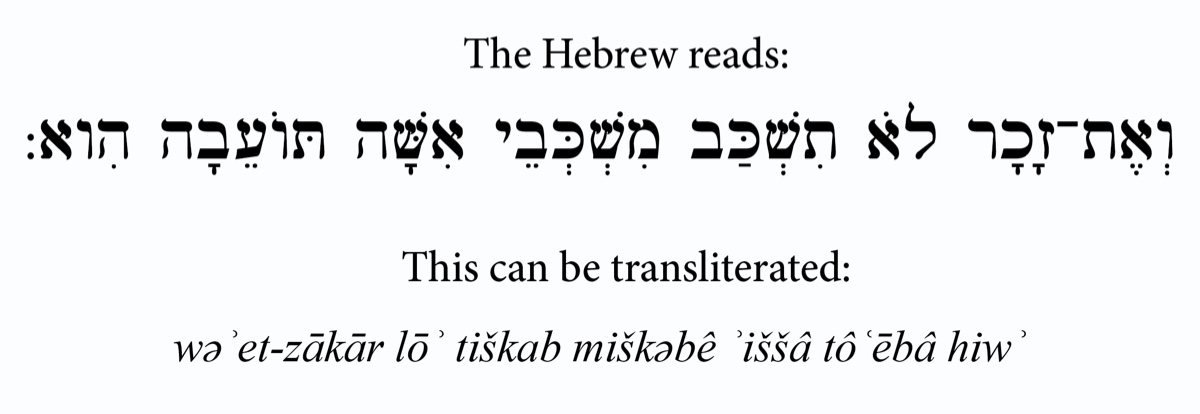by Kyle Pope
Synopsis: As modern religion embraces acceptance of sexual immorality, like-minded scholars now argue that homosexuality is not condemned in Scripture. In this study, Pope analyzes one simple verse, exposing the fallacy of this argument.
Homosexuality is a practice that was known throughout the ancient world and addressed in both biblical and extra-biblical literature. The argument that modern proponents of homosexuality make is that biblical texts condemning its practice do not address loving relationships between free adults but condemn rape, cult prostitution associated with idolatry, or sexual relations with servants and children. The assertion is made that modern opposition to homosexuality by Bible believers stems from mistranslation or misunderstanding of biblical texts addressing its practice. The assumption underlying this argument is that a loving commitment sanctifies the nature of the sexual behavior. However, this ignores the fact that many types of sexual behavior are condemned in Scripture, regardless of any loving commitment that may have been involved in their practice. For example, premarital sex (Gen. 34:7), adultery (Lev. 20:10), incest (Lev. 18:6), and bestiality (Lev. 18:22) were all condemned regardless of any love or commitment involved in the behavior.
Consideration of one simple passage cuts through these faulty arguments and makes it clear that the Holy Spirit condemns homosexual behavior in any context or relationship: Leviticus 18:22.
Leviticus 18:22 reads: “You shall not lie with a male as with a woman. It is an abomination” (NKJV).
Here’s how this can be broken down. The last two words tôʿēbâ hiwʾ are translated “it is an abomination.” This phrase is a feminine pronoun with a feminine noun that means literally “she [is] abomination”—referring to the behavior just described. This noun translated “abomination” is applied to things Israelites or sojourners in their territory were commanded not to practice (Lev. 18:26). Such behavior was part of the cause of Canaanite expulsion from the land (Lev. 18:27-28). The individual practicing such things was to be “cut off” from Israel (Lev. 18:29). This behavior was said to defile a person (Lev. 18:30), and to provoke the anger of God (Deut. 32:16).
The first three words, wǝʾet-zākār are a conjunction joined to an untranslatable direct object marker and the noun zākār, meaning “male.” This indicates that the object toward which the verb in the sentence is directed is the noun meaning “a male.” This is the noun applied to gender in the creation of human beings—“male (zākār) and female (nǝqēbâ) created He them” (Gen. 1:27b; cf. 5:2).
The fourth word is the negative particle lōʾ, meaning simply “no” or “not.” This forms the prohibitive portion of the verse. It indicates that whatever the verb describes is not to be done to the direct object of the verb.
The remaining words in the passage form a verbal phrase—tiškab miškǝbê ʾiššâ. The first word is the verb. It is from the root škab, in the 2nd person singular masculine form. It is in the imperfect, which in Hebrew is how the future is expressed—that is “You (masculine) shall.” Škab means simply “to lie down,” but the context determines if it means to lie down in sleep (Gen. 19:4; 28:11), to lie down in death (Gen. 47:30), or to lie down for sexual intercourse (Gen. 19:34-35; 26:10; 34:2; 39:7, 10). So, the verb, with the negative particle is “You (masculine) shall not lie down” and it is directed towards the noun zākār (“male”). The context makes it clear it is not talking about sleep or death. Rather, it is saying “You (masculine) shall not lie down for sexual intercourse towards a male.”
However, that’s not all in this verbal phrase. Miškǝbê ʾiššâ are two nouns in a construct form connecting them together and further describing the nature of the verbal action. ʾIššâ means “woman” and is singular in form. Miškǝb means “bed,” and is formed from the verb škab used in this passage. The -ê ending connects it to ʾiššâ and also indicates that it is plural in form. According to a lengthy entry on škab and miškǝb in the multi-volume Theological Dictionary of the Old Testament, like the verb miškǝb can apply to the place of sleep, sex, or death, but when used as a plural with a singular subject it describes sexual behavior. So, in this passage it essentially means “beds of a woman.” In other words, “in the beds of intercourse with a woman.” To express this sense, most English translations use the adverb “as” to indicate that the nature of the “lying with a male” prohibited is “as” one lies down in sexual intercourse with a woman.
Nothing is said in this passage about love, commitment, age, class, rank, or idolatry as qualifying this prohibition. It simply and clearly condemns sexual relations of men with men identifying it as an “abomination.” This makes it clear that God does not approve of homosexual behavior, regardless of the love or commitment that exists between the parties involved in its practice.
Ringgren, Helmer, Heinz-Josef Fabry, and G. Johannes Botterweck. Theological Dictionary of the Old Testament (TDOT). Grand Rapids, MI: Eerdmans Publishing House, 1977-2012.
On August 15, 2021, I preached a sermon entitled “An Argument We Must Answer” countering a scholarly article by Robert K. Gnuse entitled “Seven Gay Texts: Biblical Passages Used to Condemn Homosexuality.” Biblical Theology Bulletin 45.2 (2015):68-87. Files from this sermon are available at olsenpark.com and the video may be viewed at https://player.vimeo.com/video/587537757.
For a thorough (although explicit) treatment of the meaning of Leviticus 18:22 written by a denominational scholar, see: Honeycutt, Willie E. “The Meaning and Continuing Relevance of Leviticus 18:22 and 20:13.” Liberty University: SOR Faculty Publications and Presentations, No. 182 (May 23, 2012). https://digitalcommons.liberty.edu/sor_fac_pubs/182.


